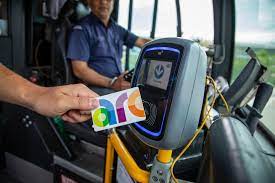August 28, 2024, the Ride Transit Program Funding Gap report goes to Executive Committee for information.
In May of this year, Edmonton Transit Services (ETS) recommended to Council’s Executive Committee to raise fares for riders to address transit funding gaps. Carrie Hotton-Mcdonald, the branch manager of ETS said that “these budget challenges, increased costs for core service components like fuel, maintenance and parts and reduced revenue required careful consideration and very difficult choices. We don’t take this lightly”. On August 28, 2024, Administration will be presenting Council with a report for information only, on ways to address the projected funding gap, which includes a proposed user fee schedule update coming to Council in the Fall 2024 Operating Supplemental Budget Adjustment. We believe that these proposed hikes to ETS fares will have negative impacts on ridership and accessibility of transit. However, we do recognize the financial pressures the City is facing, and don’t want to risk service cuts to our transit system or price and eligibility criteria changes for the Ride Transit Program or other low income passes.
The City Plan strives to keep the cost of living low for residents, with a goal of only 35% of expenses going to housing and transportation, while also shifting how Edmontonians move around the city so that half of all daily trips are by transit, walking, and cycling. We are concerned that the proposed fare increases that are coming to Council could hamper these goals and could discourage residents from using transit, further increasing the transit revenue gap. Furthermore, the City Plan also highlights the goals of being a hub for employment and eliminating houselessness, while raising fares could make it more difficult for people to access current and future employment opportunities, impacting at-risk residents the most. Ridership rates have seen great momentum over the last year, and we know fare increases will impact riders and ridership throughout the system. We are concerned these budgetary pressures will hinder that progress, and we urge the City to protect funding for this important core service for all Edmontonians.
Since the pandemic, there has been an increase in the amount of demand for the low income pass resulting in a reported $10 million shortfall for the program in 2024. ETS states another important reason to increase funding is to continue the low income rider pass. The Ride Transit Program is critical for low income transit access, providing adult and youth passes to eligible riders at a subsidised rate. This is an important program that ensures that all riders are able to take transit and move around the city. We are happy to see that Administration does not recommend changing the eligibility criteria for the Ride Transit Program, as we strongly believe this program needs to be maintained as is. Ideally, funding for low income transit should not make transit more expensive for other transit riders, and instead revenue gaps should be funded through other means. The current proposed increase in fares makes transit less affordable for riders at all income levels, which will lead to decreased ridership of up to 1.1 million fewer annual trips, as reported by ETS in their proposal. Although we don’t want to see ridership decrease (as that further impacts revenue) or fares increase, we want to highlight how important the low income pass is as a fare option and how we need to protect it, therefore we are willing to support some fare increases on other pass types in order to support our low income neighbours. We hope that Edmontonians are willing to support this needs-based approach to fares as well while the City works on sufficiently funding this important service.
On a positive note, we did want to praise the proposed multi day Arc pass that was included in the fare proposal. This is an excellent idea that can create revenue and lead to more accessible ridership. Providing more diverse fare options is a great way to get new riders on ETS.
Overall, we believe that the downsides of the currently proposed fee schedule expected to come to Council during the Fall 2024 Supplemental Operating Budget Adjustment (SOBA) outweighs the benefits that it will bring and urge the City to find alternative methods to increase revenues for ETS. The negative impacts that raising the fare will have and the loss in ridership is not worth the potential revenue. In particular, and in addition to maintaining all low income pass rates, we ask City Council and ETS to maintain the current base Arc Card fare at $2.75 per trip instead of the proposed $3.50. We believe that at minimum this is the best way to ensure that transit remains affordable overall for most users, while supporting the transition to the Arc Card payment system. We hope during the Fall 2024 SOBA that the City can find a balanced approach in order to keep service levels maintained, address funding gaps, and keep public transit affordable for Edmontonians.
___________________________
To learn more please see the resources below.

